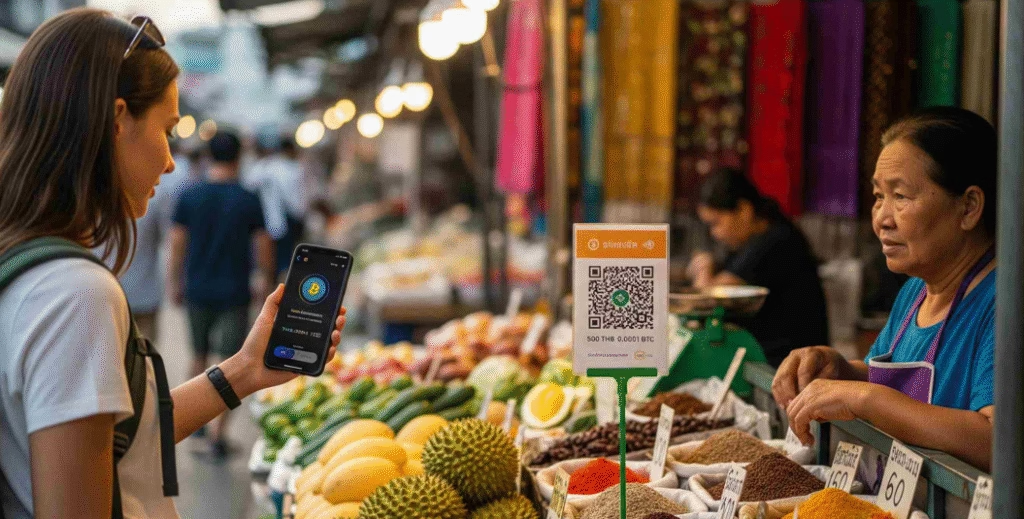Thailand is making a bold move in its push to attract more international visitors: it has launched an 18-month pilot that allows tourists to convert cryptocurrency into Thai baht for use across the country. The program, called TouristDigiPay, is not just a payment experiment — it’s a strategic gamble to reconnect Thailand’s tourism engine with the digital economy.
Tourism Recovery Meets Digital Innovation
Tourism is Thailand’s lifeline, contributing nearly $60 billion before the pandemic. But despite recovery, 2025 projections have been trimmed to about 33–35 million foreign arrivals, still below the record 39.9 million in 2019.
The government believes crypto could be a fresh lever. If each traveler spends just 5,000 baht more because of easier digital payments, officials estimate the economy could gain an extra 175 billion baht ($5.3 billion) in activity.
A Model Built for Everyday Spending
Unlike other countries that either allow Bitcoin directly or tie crypto to credit cards, Thailand’s approach is different. TouristDigiPay converts digital assets into baht instantly, which tourists then spend through e-money wallets. This makes crypto spending as seamless as scanning a QR code, a familiar routine in Thailand’s cashless ecosystem.
The real breakthrough? Accessibility for small merchants, from night market vendors to corner shops, who have typically been excluded from high-tech payment systems abroad.
Guardrails and Oversight
Thailand isn’t diving in blindly. Ensuring regulatory compliance, the system was built with the Finance Ministry, SEC, Bank of Thailand and Anti-Money Laundering Office.
Key restrictions include:
Monthly caps of around 500,000–550,000 baht (about $15K–$16K).
Per-transaction limits near 100,000 baht ($3K).
KYC and CDD checks, plus a “Know Your Merchant” system for verified retailers.
This framework reassures regulators while still offering room for expansion into big-ticket items like real estate or yachts once trust is established.
Why Tourists Might Care
For many travelers, the appeal is simple: fewer conversion hassles. Instead of swapping crypto for USD and then to baht, visitors can skip multiple exchange layers — saving on fees and time.
It also reflects a lifestyle shift. A growing segment of digital nomads and crypto holders see borderless payments as part of their identity. Thailand’s willingness to embrace this could be a differentiator in the region.
Potential Friction Ahead
Yet challenges loom. To use the system, tourists must open accounts with SEC-approved providers and go through identity verification. While standard in finance, this may discourage casual holidaymakers unwilling to hand over sensitive data to a foreign platform.
There’s also the issue of volatility. Tourists may hesitate to convert crypto during price dips, limiting uptake. Meanwhile, competitors like Vietnam and Malaysia are chasing tourists with easier draws such as visa waivers and lower costs.
Thailand’s Long Game
Crypto integration isn’t just about tourists. It’s part of a broader strategy to future-proof Thailand’s financial system. The government recently approved a five-year tax holiday on crypto profits, and the central bank continues to develop its own “tourist wallet” and explore central bank digital currencies.
Exchanges like Binance and Upbit already operate locally, signaling Thailand’s appetite to be a serious crypto hub in Asia. With TouristDigiPay, it is testing how far crypto can move from speculation into everyday life.
TouristDigiPay may not be a silver bullet for tourism, but it marks a turning point in how Thailand imagines its economic future. By marrying the country’s biggest soft power — tourism — with one of the most disruptive technologies of the decade, Thailand is not just chasing visitor numbers. It’s signaling that the Kingdom intends to play in the digital era on its own terms.
Whether tourists adopt it widely or cautiously, the message is clear: Thailand wants to be more than a beach and temple destination — it wants to be the place where digital meets local.
References
Reuters. Thailand to launch crypto-to-baht conversion for foreign tourists.
Khaosod English. Thailand Starts Testing Crypto-to-Cash Tourism Payment System.
Pintu News. Thailand’s Tourism Revitalization Through Crypto Integration with TouristDigiPay.
CryptoPotato. Thailand Launches Crypto-to-Fiat Conversions for Tourists.
















